NIDA’s Avenir Awards are designed to stimulate innovation and potentially transformative research from early stage investigators. “Avenir” is the French word for “future,” and these awards represent NIDA’s commitment to supporting researchers who represent the future of addiction science.
NIDA has three Avenir award programs, one for HIV and another on the genetics and epigenetics of substance use, and a third for chemistry and pharmacology of substance use. The Avenir Award Program for Research on Substance Use Disorders and HIV supports creative individuals who wish to pursue innovative research at the nexus of substance use and HIV/AIDS. Awardees receive up to $375,000 per year for 4 years to support their projects. The applications do not require preliminary data. Avenir program is designed for new and/or early stage investigators as defined by NIH: Early Stage Investigator Policies | grants.nih.gov.
The Avenir Award Program for Research on Substance Use Disorders and HIV (DP2)
- The PAR-23-125: Avenir Award Program for Research on Substance Use Disorders and HIV (DP2 Clinical Trial Optional) - NIDA has supported highly innovative researchers proposing potentially transformative research. The Avenir award is designed to complement the Avant-Garde award by focusing on early stage investigators. Avenir applicants may propose research in any area of high priority HIV/AIDS research that has the potential to open new areas of HIV/AIDS research and/or lead to new avenues for treatment and prevention of HIV/AIDS among substance users.
- Hear from Avenir Investigators
2025 HIV Research Avenir Award Winners
Erika Crable, PhD, MPH
University of California, Los Angeles

Erika Crable, PhD, MPH is an Assistant Professor in the Fielding School of Public Health’s Department of Health Policy and Management at the University of California Los Angeles. Her interdisciplinary research tests dissemination and implementation strategies aimed at increasing access to evidence-based substance use disorder (SUD) treatment and HIV prevention services for safety-net (e.g., Medicaid insured) and criminal justice-involved populations. Dr. Crable is also a NIDA K01 recipient and completed NIDA-funded fellowships at the Implementation Research Institute and Miriam Lifespan/Brown University Criminal Justice Research Training Program. She earned a PhD in Health Services Research at Boston University. She also previously worked as a federal policy consultant to the Centers for Medicare and Medicaid Services.
Project: Enhancing Access to Timely Research to Prevent HIV Transmission and Effectively Treat Substance Use. The purpose of this Avenir Award is to achieve widespread population health improvements in preventing HIV transmission and overdose amongst people living with substance use disorders (SUD) by mitigating barriers that hinder linkage to healthcare and social services. One in five individuals living with HIV has a comorbid SUD, highlighting the importance of increasing connectivity to low-barrier services to prevent HIV transmission and overdose and increase treatment initiation. While rigorous scientific evidence about the effectiveness and safety of these services exists, the timeliness and user-friendliness of information is limited. Dissemination strategies are critically needed to increase availability of current knowledge about effective HIV and SUD services to help prevent HIV transmission and improve health outcomes for people living with SUD. This project draws on interdisciplinary methods from health law and dissemination science while being guided by the Exploration, Implementation, Preparation, Sustainment Framework (EPIS) to reconceptualize how researchers identify dissemination opportunities across contexts to improve SUD and HIV population health outcomes. This project will rapidly build effective methods for disseminating science while increasing connectivity to services that can reduce HIV transmission and overdose to improve health outcomes for people living with SUD.
Helen Jack, MD
University of Washington School of Medicine

Helen Jack, MD is an Assistant Professor at University of Washington School of Medicine. Her research focuses on the implementation of mental health and addiction treatment in high-need primary care settings. She is a practicing primary care physician in a prison in rural eastern Washington and has a growing research focus on delivery of care in state prison systems. Her NIMH-funded K23 Career Development Award focuses on the implementation of depression treatment guidelines in primary care in Zimbabwe. Dr. Jack received her MD from Harvard Medical School and completed Internal Medicine residency at University of Washington in 2021. Prior to medical school, she studied Philosophy, Politics, and Economics at Oxford University as a Rhodes Scholar.
Project: Transforming systems of care to address HIV, HIV risk, and substance use disorders in prisons. The objective of this work is to build foundational knowledge on how to strengthen prison health systems to address disparities in HIV treatment, HIV prevention, and SUD treatment. High-performing healthcare systems, such as the Veterans Health Administration (VA), are Learning Health Systems. In Learning Health Systems, researchers partner with clinical leaders and health systems to improve the quality, efficiency, and reach of care while generating generalizable knowledge on care delivery to inform other systems. This project, embedded in Washington’s state prisons, will develop a novel model of a Prison Learning Health System. Overall, this work will launch a trajectory of research to improve care quality while generating knowledge that can inform service delivery in prisons across the country. The trauma and chronic stress of prison are undoubtably harmful to health, but centering HIV and SUD care during incarceration is one step in both Ending the HIV Epidemic and creating a more rehabilitative criminal legal system.
Omeid Heidari, PhD, MPH, ANP-C
University of Washington School of Nursing
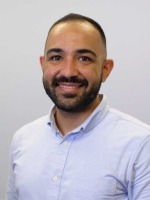
Omeid Heidari, PhD, MPH, ANP-C, is an Assistant Professor in the Department of Child, Family, and Population Health Nursing at the University of Washington School of Nursing. He completed his graduate training at Johns Hopkins University, including his postdoctoral fellowship at the Bloomberg School of Public Health in the NIDA funded Drug Dependence Epidemiology T32 training program. His research focuses on healthcare engagement for people who use drugs and people living with chronic infectious diseases through clinic, community-based, and policy interventions. He is a KL2 scholar with the University of Washington’s Institute of Translational Health Sciences with a study focused on integrated substance use disorder treatment in the HIV primary care setting. Clinically, Dr. Heidari practices as a nurse practitioner in the low barrier setting providing primary care, HIV prevention and treatment, and opioid use disorder care.
Project: Community-Based Opioid Treatment (CBOT): Development and testing of a novel nurse-led model to deliver opioid use disorder treatment and HIV prevention and care in the community setting. The purpose of this study is to develop the Community-Based Opioid Treatment (CBOT) implementation strategy to deliver buprenorphine and HIV care services to PWUO by nurse care-managers and community outreach workers and then conduct an implementation trial comparing the implementation and clinical effectiveness outcomes of CBOT compared to evidence-based, clinic delivery of opioid treatment. This study addresses a pressing need to determine the most effective approach to retention in opioid use disorder treatment and HIV care for a priority population of individuals at high risk of a drug overdose and falling out of established care.
- 2024 HIV Research Avenir Award Winner
Ayesha Appa, M.D.
University of California, San Francisco
Image
Ayesha Appa, M.D., is an Assistant Professor of Medicine in the Division of HIV, Infectious Diseases, and Global Medicine at the University of California, San Francisco, where she completed fellowships in both addiction medicine and infectious diseases. Her research focuses on integrating HIV care with substance use disorder treatment, and she is currently funded to study contingency management for stimulant use reduction and antiretroviral therapy adherence support in HIV care delivery settings. In addition to her clinical work on both the infectious diseases (ID) specialist team and the addiction medicine specialist team, Dr. Appa directs a status-neutral clinic for people who use drugs, providing low-barrier HIV/ID prevention and treatment within the Ward 86 HIV clinic at Zuckerberg San Francisco General Hospital and Trauma Center. She also serves as a staff scientist at the San Francisco Department of Public Health’s Center on Substance Use and Health.
Project: Taking Our Shot: Extended-Release Naltrexone as Opioid Overdose Pre-Exposure Prophylaxis (PrEP) in People Using Stimulants Living With or At Risk of HIV. Cocaine- and methamphetamine-related deaths involving fentanyl have risen markedly in the U.S. In San Francisco, unintentional fentanyl exposure may account for over one-third of stimulant–opioid overdose deaths among people with or at risk for HIV. To combat this, we propose “opioid overdose PrEP” using intramuscular naltrexone for individuals primarily using stimulants. Our randomized controlled trial will compare this method with a conventional harm reduction bundle, aiming to assess feasibility, acceptability, and preliminary effectiveness. We will also capture patient experiences with concurrent long-acting injectables for HIV and substance use and will create an epidemiological profile of polysubstance use and unintentional opioid exposure.
- 2023 HIV Research Avenir Award Winner
Elena Cyrus, Ph.D.
University of Central Florida
Image
Elena Cyrus, Ph.D., is an Assistant Professor in the Department of Population Health Sciences at the University of Central Florida (UCF) College of Medicine. Her Ph.D. in epidemiology was conferred from Florida International University (FIU), and she completed fellowships in reproductive health, global health, and substance use and HIV prevention at the University of Michigan, Yale University, and FIU. As a NIDA K99/R00 recipient, Dr. Cyrus’s research focuses on the development and implementation of interventions for the prevention of substance use and HIV among vulnerable populations. Dr. Cyrus also leads the UCF Global Health Program’s work at the Universidad Peruana de Ciencias Aplicadas (UPC), where she mentors U.S. and Peruvian trainees on infectious disease epidemiology and research methods.
Project: Economic Navigation and Strengthening to Realize Unrestricted Services for Transgender Women (ENTRUST). Transgender women can be economically disadvantaged and at highest risk for substance use disorders and HIV transmission, as well as nonadherence to antiretroviral treatment, yet they remain underrepresented in research. Existing programs fail to address structural barriers, such as low socioeconomic status and social marginalization, that impede access to prevention services and care. Dr. Cyrus’s Avenir project, called ENTRUST, will assess the acceptability, feasibility, and preliminary efficacy of a multilevel intervention to provide group-based financial education and photovoice training, along with individual tailored screening, brief intervention, and referral to treatment (SBIRT). ENTRUST is meant to empower and build social capital among transgender women living with HIV or at risk for HIV transmission. ENTRUST aims to improve access to substance use services and HIV care when warranted and linkage to preexposure prophylaxis programs.
- 2022 HIV Research Avenir Award Winners
Allison M. Andrews, Ph.D.
Image
Lewis Katz School of Medicine at Temple University
Allison M. Andrews, Ph.D., is an Assistant Professor in the Department of Pathology & Laboratory Medicine at the Lewis Katz School of Medicine at Temple University. Dr. Andrews is a recipient of a NIDA K01 and a former NIDA F32 and T32 trainee. She completed her Ph.D. in Biomedical Engineering from Drexel University, and two post-doctoral fellowships in cardiovascular and cerebrovascular research at Temple University. Her laboratory utilizes tissue engineering and microfluidic technologies to recreate unique physiological environments that contain barrier forming vessel networks (such as those found within the brain parenchyma and bone marrow).
Project: HIV and Cocaine Drive Bone-Marrow Blood (BMB) Barrier Dysfunction and Altered Hematopoietic Stem Cell (HSC) Differentiation Leading to Early Cardiovascular Disease: Dr. Andrews’ Avenir project will study changes in the bone marrow vasculature, microenvironment and stem cell niche that result from HIV infection and drugs of abuse. People living with HIV and those suffering from substance use disorders (SUDs) have a greater risk for accelerated cardiovascular disease. Immune cells exiting bone marrow contribute to cardiovascular disease. Therefore, this project was designed with the objective to uncover how the bone marrow microenvironment is pathologically altered during HIV infection and during SUD. This will be accomplished using tissue clearing, microCT and advanced imaging techniques to map the 3D vascular architecture in humanize HIV-infected mice. Moreover, these studies aim to develop a new human 3D tissue engineered model of the bone marrow vasculature as a test platform for the study of HIV pathogenesis and other diseases.
Peter R. Chai, M.D., M.M.S.
Image
Brigham and Women’s Hospital
Peter R. Chai, M.D., M.M.S., is an assistant professor of emergency medicine and medical toxicology at Brigham and Women’s Hospital and affiliate researcher at The Fenway Institute. His research focuses on the application of personal and population level technologies to understand changes in disease. In particular, he focuses on the use of ingestible electronic sensors to understand the context in which individuals develop behaviors of medication adherence and nonadherence. Dr. Chai is the PI on NIDA K23DA044874 which develops personalized empiric behavioral interventions that are respondent to real time changes in oral pre-exposure chemoprophylaxis (PrEP) against HIV among men who have sex with men with substance use. Dr. Chai completed his residency in emergency medicine at Rhode Island Hospital/Brown University and fellowship in medical toxicology at the University of Massachusetts Medical School.
Project: Smart Steps: A context-aware adherence intervention to improve PrEP adherence among men who have sex with men (MSM) with substance use disorder: Teaching PrEP adherence skills to optimize PrEP adherence is critical to ending the HIV epidemic. This grant develops a novel antecedent intervention, SmartSteps, which utilizes smartphone digital phenotyping to predict contexts in which PrEP nonadherence is likely to occur and delivers personalized behavioral interventions in the moment to mitigate nonadherence detected through a digital pill system. This suite of mobile technologies will help place PrEP adherence skills teaching into the moments when they are most needed and discover individual contexts in which personalized adherence interventions can be delivered.
Steven Clipman, Ph.D., M.S.P.H.
Image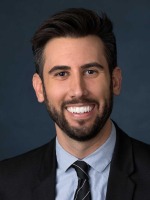
Johns Hopkins University School of Medicine
Steven Clipman, Ph.D., M.S.P.H., is an Instructor of Medicine in the Division of Infectious Diseases at the Johns Hopkins University School of Medicine. His research rests at the nexus of computational genetics, network science, and infectious disease epidemiology and is focused on leveraging innovative computational and molecular methods to address health disparities among vulnerable and underserved populations. His current work aims to understand the transmission dynamics of HIV and hepatitis C virus epidemics among networks of people who inject drugs and men who have sex with men and seeks to identify targeted intervention strategies to interrupt population-level transmission. Dr. Clipman has a computational biology background and completed a fellowship in Bioinformatics at the National Institutes of Health. He received his Master of Science in Public Health degree and doctorate in Epidemiology from the Johns Hopkins University.
Project: Molecular Networks and Deep Learning for Targeted HIV Interventions among PWID: Combating the HIV epidemic among people who inject drugs requires targeted approaches that consider multiple levels of risk extending beyond individual-level factors alone. Looking at HIV prevention through the lens of network science can allow us to study and address health disparities on a social and structural level; however, network data can be challenging to enumerate and analyze. Dr. Clipman’s project aims to leverage machine learning and viral phylogenetics to improve the use of network data to monitor epidemics and model the most effective and resource-efficient intervention strategies. This may guide officials in focusing limited resources for the greatest impact and provide a greater understanding of epidemic dynamics.
Claudia Martinez, M.D.
Image
University of Miami Miller School of Medicine
Claudia Martinez, M.D., is an Associate Professor of Medicine at University of Miami Miller School of Medicine. Her research focuses on cardiovascular health in people with HIV, identifying targets for intervention to help decrease heart disease risk. She has leveraged her own research to investigate the effect of antiretrovirals on cardiometabolic risk, the role of feminizing hormones and heart disease in transgender women with HIV, the epigenetics implication of cocaine use in people with HIV, and will now extend her work to examine the intersection of cannabis, HIV and cardiovascular health. Dr. Martinez completed her training as an internist at New York University Downtown, her Cardiology fellowship at Mount Sinai Hospital Miami and her Interventional Cardiology training at Lenox Hill Heart and Vascular Institute in New York. She joined the University of Miami as an interventional Cardiologist, where she is the cardiologist with clinical and research expertise in people with HIV.
Project: Looking into the Heart of Cannabis and HIV. Cannabis use has increased specially among people with HIV. It is not known if cannabis is associated with higher chances of heart disease or if it has a protective effect in people with HIV. The proposed research is timely, given the accessibility of cannabis, the prevalence of use in PWH, and the uncertainty regarding cardiovascular-related consequences of use. Dr. Martinez, interventional cardiologist and physician scientist focused on HIV and cardiovascular prevention, through The Avenir Award will help advance knowledge in the field of drug use, HIV and cardiovascular health.
Le Zhang, Ph.D.
Image
Yale University School of Medicine
Le Zhang, Ph.D. is an Assistant Professor of Neurology at Yale University School of Medicine. Her research focuses on the immune responses of the central nervous system in neurodegenerative diseases, including HIV-associated neurocognitive disorder, using cutting-edge single cell technologies. Dr. Zhang is a co-investigator in NIDA SCORCH (Single cell opioid responses in the context of HIV) UM1 program for generating single nucleus RNA-sequencing and epigenomic datasets for human brain regions relevant to persistent HIV infection and opioid use disorder. Dr. Zhang is a recipient of institutional and NIH funding including an NIA R56 grant focused on the immune network of the central nervous system in health and disease. Dr. Zhang received her bachelor’s degree from Peking University and her Ph.D. degree from The University of Hong Kong in Molecular Biology and Biochemistry.
Project: Immune Network Dysregulation of the Central Nervous System with HIV Persistence and Opioid Abuse. HIV persists within the central nervous system despite successful suppression of viral replication with antiretroviral therapy, leading to incomplete viral eradication as well as HIV-associated neurocognitive disorder that is further exaggerated by opioid abuse, yet the underlying molecular and cellular mechanisms remain a mystery. We will bring innovative single cell transcriptomics technologies to define dysregulated immune network in the central nervous system of individuals with HIV infection with and without opioid exposure at the single cell level. This project will open up new vistas in this important area of HIV persistence and neuroinflammation in the central nervous system and may provide foundational knowledge for the development of future therapeutics to treat HIV in individuals with and without opioid use disorder.
- 2021 HIV Research Avenir Award Winners
Matthew Akiyama, M.D., M.Sc.
Image
Albert Einstein College of Medicine and Montefiore Medical Center
Matthew Akiyama, M.D., M.Sc., is an Assistant Professor of Medicine and physician-investigator at Albert Einstein College of Medicine and Montefiore Medical Center. In addition to providing care to people living with HIV, HCV, and substance use disorders, Dr. Akiyama conducts interdisciplinary research focusing on HIV and HCV among socioeconomically marginalized populations with emphasis on models of HIV and HCV care in resource-limited settings. Dr. Akiyama is the recipient of a K99/R00 award from NIDA to develop and test an innovative strategy to improve linkage to and retention in HCV treatment among individuals recently released from jail. He is the recipient of additional institutional and NIH funding including an NIDDK P30 pilot grant focused on HCV Transmission Networks Among People Who Inject Drugs. Dr. Akiyama completed his Infectious Diseases Fellowship at New York University/Bellevue Hospital and a Master of Science in Medical Anthropology at University College London.
Project: Leveraging HCV Phylogenetic Networks to Prevent HIV and Other Blood Borne Infections Among People Who Inject Drugs. Engaging people who inject drugs is essential to ending the HIV epidemic and eliminating viral hepatitis. Needle and syringe programs and medications for opioid use disorder have been challenging to implement in low- and middle-income countries due to significant cost and complex logistics. Efficient strategies to prevent HIV and other blood borne infections are needed as harm reduction services are scaled up. The goal of Dr. Akiyama’s project is to characterize HCV phylogenetic networks to identify PWID who are highly central in injection networks and model the impact of targeted approaches to prevent HIV and other blood borne infections in Kenya, East Africa.
Hansel Tookes, M.D., M.P.H.
Image
University of Miami Miller School of Medicine
Hansel Tookes, MD, MPH is Assistant Professor of Medicine at University of Miami Miller School of Medicine. His research focuses on innovative interventions to improve health outcomes in people who inject drugs (PWID). His harm reduction research seeks to innovate and enhance the reach of syringe services programs through the testing of innovative delivery models of low barrier care. He has leveraged his own research in launching a campaign to bring syringe services programs to Miami and ultimately the entire state of Florida. Dr. Tookes received his medical and public health degrees from the University of Miami and his bachelor’s degree from Yale University. He completed his training as an internist at Jackson Health System, Miami’s public hospital, with a focus on HIV primary care and hospital medicine for the HIV and substance use disorder syndemics.
Project: Tele-Harm Reduction for Rapid Initiation of Antiretrovirals in People who Inject Drugs: A Randomized Controlled Trial. Tele-Harm Reduction seeks to engage people who inject drugs (PWID) into HIV care by bringing healthcare out of the traditional healthcare system and leveraging syringe services programs as trusted venues to deliver telehealth-enhanced access to antiretrovirals, medications for opioid use disorder, and hepatitis C cure. We urgently need a strong evidence base to prove that Tele-Harm Reduction can help us End the HIV Epidemic in PWID and save lives. We seek to set the foundation to build a new standard of care to treat HIV among PWID in the COVID-19 era and beyond.
- 2020 HIV Research Avenir Award Winners
Jacqueline Barker, Ph.D.
Image Drexel University College of Medicine
Drexel University College of MedicineJacqueline Barker, Ph.D., is an Assistant Professor in the Department of Pharmacology and Physiology at the Drexel University College of Medicine. Her graduate training in the Interdepartmental Neuroscience Program at Yale University and postdoctoral training in the Department of Neuroscience at the Medical University of South Carolina have provided a strong background in neurocognitive function and substance use disorders. Her lab investigates the neural circuits and molecular substrates regulating behavioral and cognitive flexibility and their dysregulation in disease states. To accomplish this, her work combines circuit- and cell-type specific approaches with novel pharmacological tools and animal models to assess acquired impairments following HIV infection and chronic drug and alcohol exposure.
Project: Integrating preclinical models to develop converging mechanistic data in co-occurring HIV and substance use: Dr. Barker’s Avenir project will apply these strategies to the investigation of glutamate system dysfunction during uncontrolled drug seeking in preclinical models of progressive HIV infection and cART treatment. These findings will move toward the goal of identifying robust, translatable targets for the rescue of neurocognitive impairments in people living with HIV.
Joshua A. Barocas, M.D.
Image Boston Medical Center
Boston Medical CenterJoshua A. Barocas, M.D., is Assistant Professor of Medicine at the Boston University School of Medicine and Infectious Diseases physician at Boston Medical Center. He leads an interdisciplinary research program that is specifically aimed at improving health outcomes for patients with infectious diseases including HIV and HCV, substance use disorders, and other vulnerable populations. His research uses clinical epidemiology, health economics, simulation modeling, and cost-effectiveness methods to inform clinical-decision making and health policy. Dr. Barocas received his medical degree from the George Washington University School of Medicine and Public Health. He completed his Internal Medicine residency and was subsequently Chief Resident at the University of Wisconsin Hospitals and Clinics. He then completed a fellowship in Infectious Diseases at Massachusetts General Hospital and Brigham and Women’s Hospital in Boston, MA and a post-doctoral fellowship in Dr. Benjamin Linas’ research lab before joining the faculty in 2018.
Project: Development of a novel community-based, high-performance surveillance network for drug use. Dr. Barocas’ project will create a novel surveillance network for people who use drugs utilizing an interdisciplinary approach that combines community engaged research, machine learning, indirect estimation, and dissemination science. Through this process, communities will gain a more complete understanding of context- and community-specific risk factors and the true scope of the problem. This network will facilitate rapid knowledge transfer to communities, directly informing clinical care and local policy decisions regarding service planning and resource allocation as they seek to respond to the ongoing drug epidemic in the U.S.
Sara Gianella Weibel, M.D.
Image UC San Diego
UC San DiegoSara Gianella Weibel, M.D., graduated from the University of Zurich (Switzerland). After her residency in Internal Medicine and Infectious Disease in Switzerland, she began her fellowship in the Department of Infectious Disease and Hospital Epidemiology of the University Hospital of Zurich in 2007. She moved to UC San Diego in 2009 to work as a postdoctoral fellow with Drs. Douglas Richman and Davey Smith. She joined the faculty of the Department of Medicine (Division of Infectious Diseases and Global Public Health) in 2013, and currently works both at the UC San Diego Antiviral Research Center, and in her laboratory on the UC San Diego campus, where she performs bench research. Additionally, Dr. Gianella Weibel directs the San Diego Center for AIDS Research (SD CFAR) Translational Virology Core, a position she has held since 2017.
Project: The HIV-associated Opioid Micro-Environment (HOME) Project: The proposed “HOME” project is designed to define how HIV persists in the body, and how the immune system responds to HIV in the presence of opioid use. To achieve her goals, Dr. Gianella Weibel will leverage data and tissue samples from the Last Gift cohort (http://lastgift.ucsd.edu). By characterizing the HOME in key tissues at the cellular level, she will be able to chart the places where the virus hides and understand some of the mechanisms by which it persists. The resulting blueprint of the HOME will guide the development of new methods to minimize conditions that may co-occur with HIV, such as depression or certain cancers (co-morbidities). Dr. Gianella Weibel further anticipates that the HOME study will inform strategies for HIV cures.
Jacqueline Linnes, Ph.D.
Image Purdue University
Purdue UniversityJacqueline Linnes, Ph.D., is the Marta E. Gross Assistant Professor in the Weldon School of Biomedical Engineering at Purdue University. Her research lab focuses on solving diagnostic challenges with immediate health applications for underserved populations. These projects include developing point-of-care diagnostics for pathogen detection and wearable technologies for substance use monitoring. This work emphasizes the translation of fundamental microfluidics and biological assays into point-of-care diagnostics using human-centered design principles. Dr. Linnes’s experience in translational research includes co-founding and managing early-stage field-testing and user feedback for multiple startup companies. She has developed and tested mobile diagnostics and wearable devices for use in community settings in the United States and throughout the world.
Project: Pont-of-use Acute HIV Infection Diagnostic for Substance Using Populations: The goals of this research are to understand how systemic barriers to care limit HIV testing and treatment among people who use drugs and to develop and evaluate a novel, highly sensitive handheld diagnostic for acute HIV infection. This research integrates user-centered design and community-based participatory research to inform the technology development. The proposed sample-to-result molecular diagnostic test would enable community-based testing for acute HIV infections from whole blood with high sensitivity, specificity, and accuracy. This new approach to diagnose acute HIV is designed to engage people who use drugs in the care continuum at the earliest stages of infection and prevent HIV transmission.
Pablo Penaloza-MacMaster, Ph.D.
Image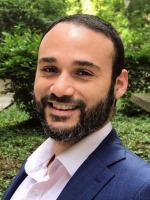 Northwestern University
Northwestern UniversityPablo Penaloza-MacMaster, Ph.D., is an Assistant Professor at Northwestern University. He completed his graduate studies at Emory University in the laboratory of Dr. Rafi Ahmed, where he demonstrated the suppressive effects of T regulatory cells in chronic viral infections (JEM, 2014). He then completed his postdoctoral studies at Harvard University in the laboratory of Dr. Dan Barouch, where he investigated unexpected detrimental effects by CD4 T cell-based vaccines (Science, 2015). He started his laboratory at Northwestern University in the summer of 2016, and his research has been focused on understanding adaptive immune regulation following natural infection and vaccination. His laboratory recently demonstrated the concerted role of immune checkpoints and innate immune pathways in regulating T cell exhaustion during chronic viral infection (PLOS Pathogens, 2019).
Project: Interferon-modulated vaccines against HIV: Dr. Penaloza’s Avenir proposal is aimed at developing interferon-modulated vaccines against HIV. He will develop antigenically tailored HIV vaccines containing diverse envelope sequences derived from HIV+ individuals who inject drugs, with the goal of improving immune coverage in this population.
- 2019 HIV Research Avenir Award Winners
Ian W. Holloway, Ph.D.
Image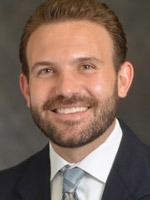 University of California, Los Angeles
University of California, Los AngelesDr. Holloway is a licensed clinical social worker and an associate professor of social welfare at the University of California, Los Angeles. His applied behavioral health research examines the contextual factors that contribute to health disparities among sexual and gender minority populations. He is an expert in social network analysis and how social media and new technologies can be harnessed for health promotion and disease prevention. Dr. Holloway has been a principal investigator on research studies funded by the Department of Defense, the California Tobacco Related Disease Research Program and the California HIV/AIDS Research Program. He holds master’s degrees in social work and public health from Columbia University and a Ph.D. in social work from the University of Southern California.
Gregg Steven Gonsalves, Ph.D.
Image Yale University
Yale UniversityDr. Gonsalves is an Assistant Professor of Epidemiology (Microbial Diseases) at the Yale School of Public Health and a member of the Public Health Modeling Unit. He is also an Associate (Adjunct) Professor of Law at Yale Law School, where he co-directs the Global Health Justice Partnership. His research uses quantitative models to improve the response to the syndemic of substance use, infectious diseases and social inequality. For more than 30 years, he worked on HIV with organizations around the world, including the AIDS Coalition to Unleash Power and the AIDS and Rights Alliance for Southern Africa. He is a 2011 graduate of Yale College and received his Ph.D. from Yale Graduate School of Arts and Sciences in 2017. He is a 2018 MacArthur Fellow. More about Dr. Gonsalves
Alon Herschhorn, Ph.D.
Image University of Minnesota
University of MinnesotaDr. Herschhorn is an assistant professor in the Division of Infectious Diseases and International Medicine at the University of Minnesota. Dr. Herschhorn received his Ph.D. from Tel Aviv University in Israel, completed his postdoctoral training at Dana-Farber Cancer Institute / Harvard Medical School (DFCI/HMS), and joined the DFCI/HMS faculty as Instructor in Microbiology and Immunobiology in 2013. He uses interdisciplinary approaches at the interface of synthetic and molecular virology, immunology and cell biology to develop a comprehensive research program for studying virus-host interactions at the molecular and cellular levels, with the aim of translating new insights into novel therapies and vaccines to treat and prevent viral infections. Dr. Herschhorn’s Avenir application is focused on delineating and targeting the pathways used by HIV to escape broadly neutralizing antibodies.
Annick Bórquez, Ph.D.
Image University of California, San Diego
University of California, San DiegoDr. Bórquez is an HIV and drug use epidemiologist whose research seeks to better understand, predict and respond to intersecting epidemics of drug use disorders and associated health harms, with a focus on social and structural determinants of health. She develops and integrates mathematical modeling methods with health economics and qualitative research methods to inform effective policy decision making in this field. Dr. Bórquez’s project will focus on enhancing public health preparedness to emerging drug use epidemics in the United States and will pilot an online outreach intervention to facilitate linkage to health and harm reduction services in the context of emerging drug use epidemics. Dr. Bórquez has a background in medical microbiology from the University of Edinburgh and holds a MSc and a Ph.D. in epidemiology from the department of Infectious Disease Epidemiology at Imperial College London. More about Dr. Bórquez
- 2018 HIV Research Avenir Award Winner
Ashley Buchanan
Image University of Rhode Island
University of Rhode IslandAshley Buchanan, DrPH, is an Assistant Professor of Biostatistics at the University of Rhode Island, where she specializes in the areas of Biostatistics and Epidemiology. She received her Doctorate in Public Health at the University of North Carolina at Chapel Hill in 2015 and was a Postdoctoral Research Fellow at Harvard T.H. Chan School of Public Health in 2016. She has domestic and international experience collaborating on HIV/AIDS research to develop and apply causal methodology to improve treatment and prevention of HIV/AIDS. Dr. Buchanan’s research program focuses on causal inference, including generalizability and interference, observational studies, and network science. Dr. Buchanan’s Avenir application is focused on the advancement of HIV prevention and treatment research by studying drug users who are part of social networks or communities that may exert biological or social influence on their members.
- 2017 HIV Research Avenir Award Winner
Zachary A. Klase
Image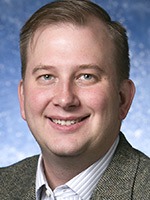 The University of the Sciences in Philadelphia
The University of the Sciences in PhiladelphiaZachary A. Klase, Ph.D., is an Assistant Professor in the Department of Biological Sciences at The University of the Sciences in Philadelphia. He received his doctorate in Immunology and Tropical Medicine at the George Washington University in 2009, received postdoctoral training at the Laboratory of Molecular Microbiology, National Institute of Allergy and Infectious Diseases, and joined the faculty of USciences in 2014. Dr. Klase’s research program focused on the molecular pathogenesis of HIV-1, with a particular emphasis on cure research. He has expertise in examining the intricacies of chromatin modification at the integrated provirus, and his laboratory has developed new tools to visualize the chromatin landscape as it relates to viral latency. His Avenir application is focused on examining how drugs of abuse may alter the epigenetic landscape in HIV-1 infected individuals.
- 2016 HIV Research Avenir Award Winners
Michael E. Newcomb
Image Northwestern University
Northwestern UniversityMichael E. Newcomb, Ph.D., is Assistant Professor in the Department of Medical Social Sciences at Northwestern University and the Associate Director of Scientific Development of the Northwestern Institute for Sexual and Gender Minority Health and Wellbeing (ISGMH). He received his doctorate in Clinical Psychology at the University of Illinois at Chicago in 2012. Dr. Newcomb’s research program broadly focuses on health disparities in adolescents and young adults. He has particular expertise in HIV and substance use prevention among young gay and bisexual men and prioritizes understanding the interpersonal contexts that lead to resilience against negative health outcomes, including healthy romantic relationships and family functioning. Dr. Newcomb's research program seeks to develop interventions that mitigate health disparities by capitalizing on these resiliencies.
Daniel Lingwood
Image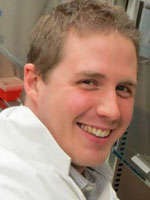 Ragon Institute of MGH, MIT and Harvard
Ragon Institute of MGH, MIT and HarvardDaniel Lingwood, Ph.D., is an assistant professor at The Ragon Institute of MGH, MIT and Harvard and is a faculty member in the Virology Program at Harvard Medical School. Dr. Lingwood received his Ph.D. from the Max Planck Institute for Molecular Biology and Genetics, conducted postdoctoral work at the Vaccine Research Center at NIH, and joined the Ragon faculty in 2014. Dr. Lingwood has garnered international recognition for his discovery that humans possess genetically-encoded antibody sequences that when properly presented as germline B cell receptors, naturally engage conserved sites of viral vulnerability and serve as substrates upon which broadly neutralizing antibodies can be developed. Dr. Lingwood’s lab now centers on defining how this germline antibody 'pattern recognition' can be harnessed as a genetic template for vaccine design.
Alexander Marson
Image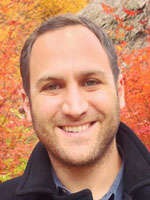 University of California, San Francisco
University of California, San FranciscoAlexander Marson, M.D., Ph.D., is currently a Sandler Faculty Fellow and a clinical fellow in infectious diseases at UCSF and will become assistant professor in the UCSF Department of Microbiology and Immunology in July, 2016. He completed his M.D./Ph.D. training at Harvard and MIT and internal medicine residency at Brigham and Women’s Hospital. He is also affiliated with the UCSF Helen Diller Family Comprehensive Cancer Center and the Innovative Genomics Initiative. Dr. Marson’s research integrates systems-scale investigations of human CD4+ T cell circuitry with functional perturbation studies. His laboratory has developed new tools for experimental and therapeutic genome engineering in primary human T cells using CRISPR/Cas9 ribonucleoproteins (RNPs). These studies are designed to develop targets for a new generation of HIV therapeutics aimed at eradicating latent virus from patients.
Sunil Suhas Solomon
Image Johns Hopkins University School of Medicine
Johns Hopkins University School of MedicineSunil Suhas Solomon, MBBS, Ph.D., MPH, is an Assistant Professor in Medicine, in the Division of Infectious Diseases, at the Johns Hopkins University School of Medicine. He completed his medical training at the Sri Ramachandra Medical University in Chennai, India and received a Masters in Public Health and a doctorate in Epidemiology from the Johns Hopkins University. His research is focused on epidemiology, clinical management and access to HIV and HCV care among vulnerable Indian populations such as people who inject drugs and men who have sex with men. His Avenir application is focused on identifying innovative cost-effective strategies that capitalize upon network-connectedness of People Who Inject Drugs (PWID) to identify viremic HIV-infected persons who may or may not be aware of their HIV or HCV status and link them to care centers.
Ryan Westergaard
Image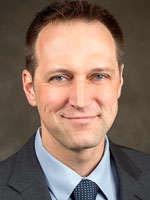 University of Wisconsin School of Medicine and Public Health
University of Wisconsin School of Medicine and Public HealthRyan Westergaard, M.D., Ph.D. MPH, is an assistant professor at the University of Wisconsin School of Medicine and Public Health. Dr. Westergaard attended medical school at Johns Hopkins University. He completed a primary care internal medicine residency at the University of Colorado at Denver, where he was also a staff physician at Denver Health Medical Center. He received fellowship training in infectious diseases at Johns Hopkins Hospital and the Johns Hopkins AIDS Service, and completed clinical research training at the Bloomberg School of Public Health under the mentorship of Dr. Gregory Kirk. His current research projects involve interventions to improve quality and continuity of care for HIV-infected patients, with special emphasis on people with psychiatric illness, people who use drugs and prisoners.
- 2015 HIV Research Avenir Award Winners
Alejandro B. Balazs, Ph.D.
Image Harvard Medical School
Harvard Medical SchoolDr. Alejandro B. Balazs is an Assistant Professor of Medicine at Harvard Medical School and a Principal Investigator at the Ragon Institute of MGH, MIT and Harvard in Cambridge, MA. Dr. Balazs received his PhD from Harvard University and conducted postdoctoral research at the California Institute of Technology prior to joining the faculty at Harvard Medical School in 2014. He leads a laboratory that explores the fundamental mechanisms by which the immune system prevents the establishment of infection by employing immunological engineering as a tool to dissect the underpinnings of protection mediated by the natural immune system. His group is focused on applying this understanding to the development and implementation of novel technologies to engineer immunity as an alternative approach towards preventing or treating infection.
Brandon D.L. Marshall, Ph.D.
Image Brown University School of Public Health
Brown University School of Public HealthBrandon Marshall, PhD is an Assistant Professor & Graduate Program Director in the Department Epidemiology at the Brown University School of Public Health. He received his PhD in epidemiology from the University of British Columbia, completed postdoctoral training at Columbia University, and joined the faculty at Brown University in 2012. His research focuses on substance use epidemiology and the social, environmental, and structural determinants of health of urban populations. His research group uses high-resolution computer simulations to identify new strategies that prevent HIV infection among people who use drugs. He has published more than 75 scientific publications, including articles in JAMA, BMJ, and The Lancet.
Christina S. Meade, Ph.D.
Image Duke University School of Medicine
Duke University School of MedicineChristina S. Meade, PhD, is Associate Professor of Psychiatry & Behavioral Sciences at Duke University, with secondary appointments in Global Health and Psychology & Neuroscience. Dr. Meade received her PhD in clinical psychology from Yale University and completed a NIDA-funded postdoctoral fellowship in drug abuse and brain imaging at McLean Hospital/Harvard Medical School. In 2008, she joined the faculty at Duke University. Dr. Meade has extensive expertise in the fields of neuroAIDS and addiction, with innovative projects in the United States and South Africa. Her program of research takes a multi-disciplinary approach that integrates state-of-the-art methodologies to investigate neuropsychiatric and neurobehavioral outcomes in drug users living with or at high risk for HIV infection.
Daniel Werb, Ph.D., M.Sc.
Image University of California, San Diego School of Medicine
University of California, San Diego School of MedicineDan Werb, PhD, is a proposed Assistant Professor in the Division of Global Public Health at the University of California San Diego. Dr. Werb received his PhD from the University of British Columbia, and was a Visiting Scholar at the University of California San Diego. Dr. Werb also holds appointments as a Research Scientist at the Centre for Research on Inner City Health at St. Michael’s Hospital in Toronto and the BC Centre for Excellence in HIV/AIDS in Vancouver. He has garnered international recognition for his investigations of the natural history of injection drug use – including his exploration of factors influencing the initiation of injection drug use – as well as for his analyses of the impact of illicit drug policies on HIV risk among people who inject drugs. Dr. Werb’s current focus is on developing structural interventions to prevent the initiation of injection drug use in an effort to prevent the spread of injection-driven HIV epidemics.
